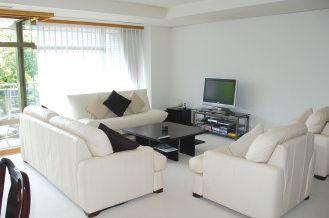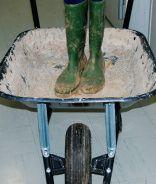Living in Japan
Four interviews with four different foreigners about their varied experiences of buying or renting property in Japan.
By Peter Harris
Name: Leanne George
Home Country: United Kingdom
Residential Status:
Living in a 4 bed-roomed apartment in Minami Aoyama, Tokyo, at a cost of JPY1million a month, with her husband and daughter. Rent is covered by husband’s ex-pat contract.
How did you end up living in Japan?
We used to live in a 4 bedroom detached house with a garden in the UK. One day my husband came home and said, “How would you like to live in Japan?” I thought yes, ‘I can do Japan’ with some intrepidation and within 8 months we were here and living in an apartment.
Can you tell me a bit about the process of finding an apartment?
It was a bit of a challenge. We have a daughter in elementary school, so finding the school actually came before choosing a location. Prior to moving we came over about 6 months before and looked around a number of schools and 17 apartments/houses. The office appointed a real estate agent for us who was bilingual and did a good job of listening to our needs and concerns. Aside from being near the school we were insistent on having 4 bedrooms. We also asked the agent to throw in a few ‘wild card’ options just so we had a good idea of what was really out there. Initially I thought living in Japan meant living in a box, but once I’d seen our budget and had a look around I knew we’d be able to find something nice and spacious and I’m really happy with the place.
 The George's spacious, luxury lounge
The George's spacious, luxury lounge
What were the most challenging parts of the process?
Information overload. There is just so much to take in and from visiting different apartments and schools there was a huge volume of paperwork. The names were alien and it was very hard to picture how things would actually be.
Shipping possessions was a big decision too. Because it takes so many weeks to ship everything from the UK, you have to decide whether you want to send things early and camp in your home before you leave or keep normality up to the last minute and then camp out when you arrive. We decided to keep normality until we left and then hire furniture, crockery and so on until our things arrived 4 weeks later. Not having the computer, and therefore Internet, was tough and we ended up with a very high telephone bill for that first month – probably when you need to keep in touch with home the most. We had to go out and buy electrical goods like a TV and DVD player because you need that when you are so disorientated- home comforts- the electrical items we brought from the UK were of a different voltage and no use here in Japan. That said, when our stuff did finally arrive it was like Christmas, it was great to see familiar items and have things from home.
 Mr. George's wheelbarrow and concrete boots
Mr. George's wheelbarrow and concrete boots
Any surprises along the way?
Well it’s often said, but the Japanese efficiency really was incredible. For example, when our 147 boxes did arrive we had to get all the rental gear out of the apartment in the morning and all the boxes in by the end of the day. Four guys came in and the operation was very smooth and slick – they kept to their deadlines without any trouble. We probably gave the removal people a bit of a surprise too. As they were bringing in our boxes one of the men came and explained there was an item, that he didn’t know the name of in English, but that he wasn’t sure where we wanted it put. Rather puzzled I went down to see what he was talking about and burst out laughing when he showed me my husband’s wheelbarrow and a pair of his old muddy boots that he had shipped by mistake!
What advice would you give to anyone about to move out to Japan?
The key is to be realistic, do your homework, talk to people and think about what all the family wants and needs from the experience. If you come with unrealistic expectations then you could easily be disappointed. On the practical side, get a good agent and don’t be afraid to ask for what you really want. Then when you get here go out and explore, work out where the supermarkets are. When you first arrive you end up paying a lot for things because it takes a while to get used to the currency and to find the better deals.
Name: Dr. Justin Dann
Home Country: Australia
Residential Status:
Lives with his wife Naomi in a house in Kashiwa, Chiba. The house cost JPY18,900,000 and is in his own name.
How did you end up living in Japan?
I was a student at university in Saga back in 1998 and then I moved here in 2002 when I was working for Masterfoods. Now I run my own online language school here (www.osnavi.jp) and my wife is Japanese too.
Can you tell me a bit about the process of buying a house in Japan?
Well, everyone told me that as a foreigner, it would be impossible on a spouse visa and initially I was turned down a bank loan by UFJ precisely because of that. However, when I spoke to an agent he told me that I could get a loan without difficulty if I went through him. I arranged a full loan via Tokyo Mitsubishi at what were actually very favorable rates. I got a 1% reduction on the interest and then a further 1% deductible from taxable income so it works out that for the first 3 years I get an interest rate of 0.75%. I’ve heard that if you want to buy a second house things are much more complicated though. I guess the agent did a good job because they get a really high commission.
Less on the technical side we had to move in on a particular day according to Shinto lore – my wife consulted with her family to decide the most auspicious date and we moved in then.
 Dr.Dann - Found buying a house in Japan much easier than he expected>
Dr.Dann - Found buying a house in Japan much easier than he expected>
What were the most challenging parts of the process?
To be honest it was much easier than I expected. I thought that the hard part would be getting the loan but I didn’t find that to be the case. I guess it is always hard knowing where to look but there are some great websites and finding a good agent helps a lot. I looked at 8 to 10 houses in a period of 2 months initially looking for second hand because the depreciation on a new property is so high, but then we found a new place that was only about a million more than many of the second hand properties so we went for that. For some people I think the language barrier can be quite tough but my wife really helped.
Any surprises along the way?
Well, one interesting thing is that although it is supposed to be harder to buy a house as a foreigner, we found it difficult to get the house in both my wife’s and my name, because I was the one whose bank account the money came from. The only way Naomi could be a co-owner was if I gave her half of the house as a gift – and then we would have to pay a gift tax on that so in the end it is just in my name.
Also, we were told that the plot of land nearby couldn’t be built on because it used to be the site of a castle and so an excavation had to take place first. Not long after we moved in, a bulldozer came and conducted what appeared to be a very shallow dig and then promptly declared the area free of archaeological remains. Building started soon after that.
What advice would you give to anyone thinking of buying a house in Japan?
Don’t be put off by the stories that buying in Japan as a foreigner is a nightmare. Even on a spouse visa I was able to get a loan for the full value of the property I wanted to buy. If you can get a native speaker to be with you during the key money (introduction fee to landlord) parts of the process that’s an enormous advantage as well.
Name: Mark H. Saft
Home Country: USA
Residential Status:
Mark Saft lives with his wife Kanya and their two cats, Zoe and Persia, in a 4 bedroom rented apartment with a study in Azabudai, Tokyo.
How did you end up living in Japan?
I had an interest in Japan at least 7 years before I came here through my studies and reading. I then came to Japan on the Japan Exchange & Teaching Programme (JET) in 1993 and spent two years in the countryside in Fukuoka-ken. I had always wanted to live in Tokyo and so moved here in 1995. Back in 2000 I set up The Ingenium Group, an executive search firm which specializes in identifying and attracting bilingual Asian executives for firms in Japan and throughout the Asia Pacific region.
 Mark Saft relaxing at home with his wife Kanya
Mark Saft relaxing at home with his wife Kanya
Can you tell me a bit about the process of finding your apartment?
We used to live up near the Tokyo Midtown Project but we were given notice that because of the development in the area, our building was going to be knocked down and rebuilt. This worked out rather well and we ended up negotiating several months rent as compensation for having to move prior to the expiration of our lease. My wife, Kanya, and I looked at about 35 places over 3 1/2 months. We used a few agents who were generally helpful and listened to our requirements: a spacious apartment in a quiet area, close to the office with enough bedrooms to start a family.
What were the most challenging parts of the process?
You have to be aware that the process takes time. Partly because it wasn’t until we started pushing a bit that the agents actually started to show us the really good grade places rather than the places that had been on the market for a long time. Before finding the perfect place we looked at some really outrageously overpriced apartments as well.
When we went through with the move we had a hard time with the moving company. We found one that was a lot cheaper than the rest and assumed that because this is Japan, the service would probably be good and efficient anyway. We were wrong. The company we chose was slow, disorganized and broke things, including a painting of sentimental value – they didn’t finish moving us in until 3am! Believe me, when it comes to something as important as moving it’s not worth it to try to save 50,000 yen. Go with an established reputable company (I have heard good things about Premier Asian Tigers and Duck) I really wish I had used them instead of the company that did our last move.
Any surprises along the way?
Not really although we do know some people who found out after they moved in that something very unpleasant had happened to the previous tenants. You should always ask who the previous tenants were and the estate agent should tell you this. Apart from that I think the moving agents were probably surprised themselves by the “Defender” arcade machine – my Valentine’s Day present for Kanya!! – that we have in the study!
What advice would you give anyone looking for an apartment in Japan?
Firstly there’s the time issue – take your time and be clear about what you want. Then, if you have already been living in Japan, you can make use of your knowledge and contacts much more than someone coming in for the first time. Make your demands clear to the agent. We said from the start, just don’t bother showing us places that require key money because we won’t be interested. Everything is negotiable.
Also, when it comes to finding a suitable apartment, I think people would be welladvised to pay the most they possibly can afford to pay for rent. Your apartment is not just where you sleep but also where you rest and recuperate so you have to be comfortable. Commuting can be a grind too; better to pay more and make life easy on yourself and allow your family more time to be together. Finally, make sure you budget enough to get a good moving company.
Name: Sven Sorrell
Home Country: United Kingdom
Residential Status:
Living in a room in a guesthouse for foreigners (gaijin house) in Moto Azabu, Tokyo. Pays rent of around JPY80,000 a month.
How did you end up living in Japan?
I never took time out before university so I decided to take a gap year teaching English in Japan when I graduated – that was 4 years ago.
Can you tell me a bit about the process of finding your room?
I was living in an apartment that I shared with another guy. Unfortunately, he was on a bicycle and crashed into a lady who then hit him with a pole and it all got rather unpleasant. He ended up having to move away to be safe and I was left having to look for somewhere else. I decided to move to a gaijin house for a month or two while I looked for a new place, that was almost a year ago now. I guess I’m the kind of person who gets stuck places. The good thing about gaijin houses is that you don’t have to pay any kind of key money or deposit and it’s cheap and central.
 Sven reclining on a sofa in the common area of the gaijin house
Sven reclining on a sofa in the common area of the gaijin house
What were the most challenging parts of the process?
Well it’s pretty easy because you just look online and it’s all in English. Also you don’t have to pay bills – water, electricity and things are all set up. However, when maintenance is needed, to fix the Internet or replace furniture the staff are not very efficient. When you first arrive you go to the office and they give you a key and a map so you have to organize moving your possessions yourself – rent is cheap though so it’s not that surprising.
Any surprises along the way?
Not really, the surprises have come since moving in. Firstly, I’m still living there which wasn’t my intention but it’s just so easy and the other people are friendly. It’s a pity but I’ve also had some bad experiences too. I had a shirt stolen from the washing line the first week I moved in, and my shower gel was taken too. More recently someone has been taking people’s shoes from the genkan (entrance area). It’s puzzling because the shoes stolen have been men's, women's, old, new, big and small!
What advice would you give to anyone thinking about moving into a gaijin house?
Have an open mind and try to get on with the other people in the house – make sure you have a life outside of the house too, otherwise what’s the point of being in Japan?
There are some really good websites around for finding gaijin houses but you never really know what it'll be like until you move in. Try and look first if you can. Also, be prepared for the make-up of the house to change because of the high turnover of tenants. When I came the house had lots of Americans, then it went through a more German phase, and now it seems to be the time of the French! That makes things interesting too though, and creates a rare multilingual environment.
Finally, I’d recommend not leaving your shoes in the entrance.






Comments
Scott Colquhoun (not verified)
June 5, 2008 - 14:19
Permalink
Wanting to buy in Okinawa
What kind of a down payment is expected/required?
A friend of mine here had the company that built his house load him 2.5M yen so he would have it in his account when they approached the bank for a loan. After the loan was approved and settled, they transferred the cash back. Nice incentive I think.